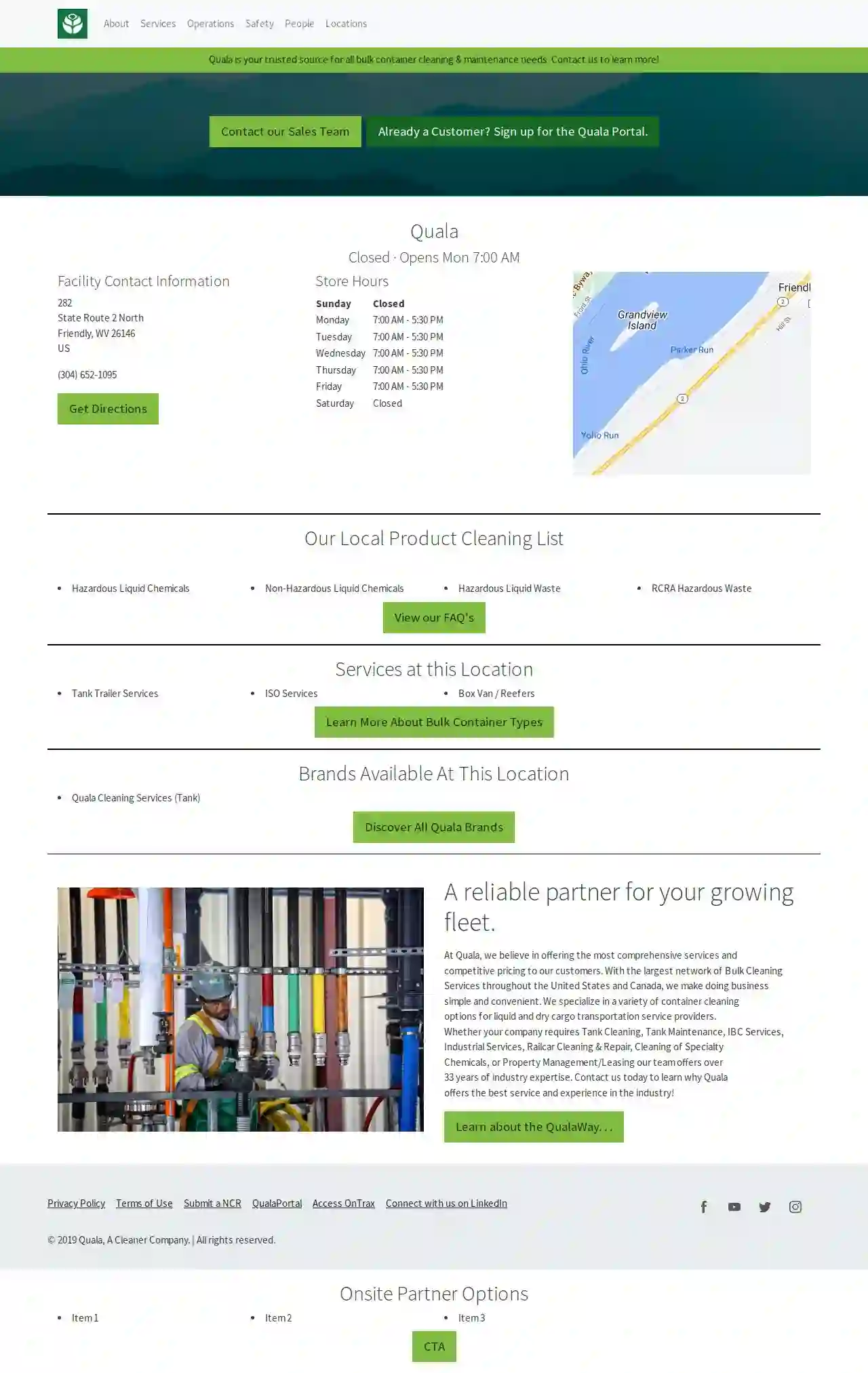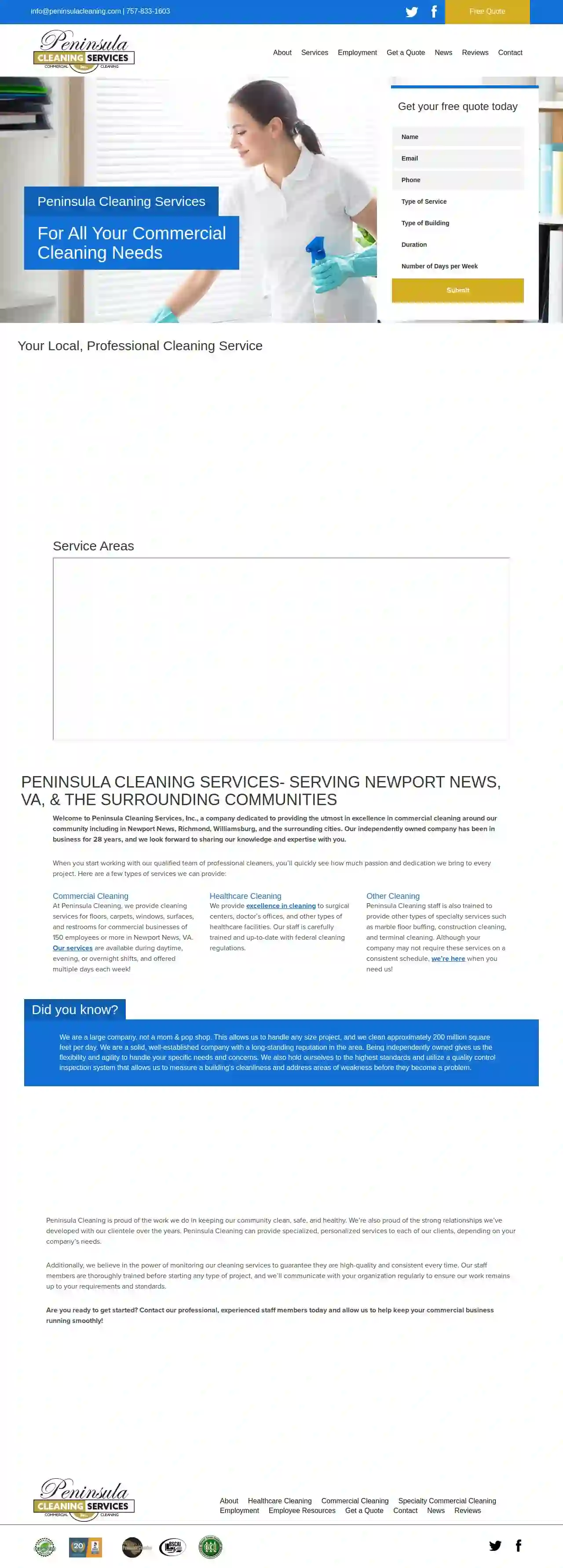Cleaning Services Difficult Run
Top Residential Cleaning in Difficult Run
Receive 3 FREE House Cleaning quotes for your project today! Compare profiles, reviews, accreditations, portfolio, etc... and choose the best offer.
Service Needed
City or Town

Cleaning Plus
4.98 reviewsWinchester, US- Services
- Why Us?
- Gallery
Get Quote
Nowa Diamond Shine, LLC
4.9153 reviewsWinchester, US- Services
- Why Us?
- Gallery
Get Quote- Sh
Shanna's Cleaning Service
4.212 reviews123 Main St, Springfield, 12345, USShanna's Cleaning is a professional cleaning service dedicated to providing top-notch cleaning solutions to homes and businesses. With a focus on customer satisfaction and quality service, Shanna's Cleaning strives to make every space sparkle and shine.
- Services
- Why Us?
- Accreditations
- Our Team
- Testimonials
- Gallery
Get Quote 
Scioto Services dba Winans Services
3.37 reviewsWinchester, US- Services
- Why Us?
- Gallery
Get Quote
Quala
4.514 reviewsWinchester, US- Services
- Why Us?
- Gallery
Get Quote- Co
Coverall of Virginia Beach
3.58 reviewsVirginia Beach, US- Services
- Why Us?
Get Quote 
Clark Professional Cleaning
521 reviewsChesapeake, US- Services
- Why Us?
Get Quote
Imperial Cleaning
4.699 reviewsSuffolk, US- Services
- Why Us?
Get Quote
Peninsula Cleaning Services, INC
3.724 reviewsNewport News, US- Services
- Why Us?
Get Quote
We Mean Clean
4.663 reviewsArlington, US- Services
- Why Us?
Get Quote
Over 60,241+ Janitorial Companies on our directory
Our cleaning pros operate in Difficult Run & surrounding areas!
CleaningMatch has curated and vetted Top Janitorial Services near Difficult Run. Find the most trustworthy contractor today.
Frequently Asked Questions About Cleaning Services
Find answers to common questions about cleaning services and hiring cleaning companies in the USA.
- Online Directories: Use online directories like CleaningMatch to search for cleaning services in your area. Filter your search results by the specific cleaning type you need.
- Search Engines: Use search engines like Google to find cleaning services specializing in your desired cleaning type. For example, search for 'post-construction cleaning services near me' or 'eco-friendly cleaning services in [city name].'
- Ask for Referrals: Ask friends, family, neighbors, or colleagues if they know of any reputable cleaning services specializing in your desired cleaning type.
- Check Company Websites: Visit the websites of cleaning services in your area to see if they list the specific cleaning type you need among their services.
- Contact Companies Directly: Contact cleaning companies directly to inquire about their specialization in your desired cleaning type.
- Blot, don't rub: When treating fresh stains, blot with a clean cloth or paper towel to absorb as much of the stain as possible. Rubbing can spread the stain and damage carpet fibers.
- Club Soda: For spills like wine or coffee, pour club soda on the stain, let it fizz, then blot with a clean cloth. Repeat if needed.
- Vinegar Solution: Mix equal parts white vinegar and water, apply to the stain, and blot. Vinegar helps remove stains and odors.
- Baking Soda Paste: Make a paste with baking soda and water, apply to the stain, let it dry, then vacuum. Baking soda absorbs odors and lifts stains.
- Commercial Carpet Cleaner: : Use a commercial carpet cleaner according to the instructions. Choose a cleaner specifically designed for the type of stain you're dealing with.
- Professional Carpet Cleaning: For stubborn or deeply set stains, consider hiring a professional carpet cleaning service. They have specialized equipment and expertise in stain removal.
- Regular Sweeping or Dust Mopping: Sweep or dust mop hardwood floors daily to remove dust, dirt, and debris.
- Vacuuming: Vacuum hardwood floors weekly using a vacuum cleaner with a hardwood floor attachment to avoid scratches.
- Damp Mopping: Damp mop hardwood floors with a hardwood floor cleaner as needed. Avoid excessive water, as it can damage the wood.
- Prevent Scratches: Place felt pads under furniture legs to prevent scratches. Avoid dragging heavy objects across the floor.
- Avoid Harsh Cleaners: Do not use harsh chemicals, abrasive cleaners, or furniture polish on hardwood floors.
- Professional Cleaning: Consider hiring a professional hardwood floor cleaning service for deep cleaning and refinishing as needed.
- White Vinegar: A versatile cleaner that cuts through grease, removes stains, and deodorizes. Mix equal parts water and vinegar for a general-purpose cleaner.
- Baking Soda: A natural abrasive and deodorizer. Sprinkle baking soda on surfaces, let it sit, then scrub and rinse.
- Lemon Juice: Acts as a natural bleaching agent and disinfectant. Mix lemon juice with water for a cleaning solution or use it directly on stains.
- Castile Soap: A gentle and biodegradable soap made from plant oils. Mix a few drops of castile soap with water for a versatile cleaning solution.
- Essential Oils: Add a few drops of essential oils like tea tree oil or lavender oil to cleaning solutions for a natural fragrance and antibacterial properties.
How do I find a cleaning service that specializes in [specific type of cleaning]?
If you need a cleaning service specializing in a particular type of cleaning, such as post-construction cleaning, window cleaning, or green cleaning, follow these steps:
By using these methods, you can find a qualified cleaning service that meets your specific cleaning needs.
By using these methods, you can find a qualified cleaning service that meets your specific cleaning needs.
How can I get rid of tough stains on carpets?
Tough carpet stains can be challenging, but several methods can help:
Always test any cleaning solution on a small, inconspicuous area of the carpet first to ensure it doesn't cause discoloration or damage.
Always test any cleaning solution on a small, inconspicuous area of the carpet first to ensure it doesn't cause discoloration or damage.
What are some tips for cleaning hardwood floors?
Hardwood floors add elegance and warmth to a home, but they require proper care to maintain their beauty. Here are some tips:
By following these tips, you can keep your hardwood floors looking beautiful for years to come.
By following these tips, you can keep your hardwood floors looking beautiful for years to come.
What are some eco-friendly cleaning solutions?
Eco-friendly cleaning solutions are becoming increasingly popular as people prioritize sustainability and a healthier indoor environment. Here are some effective and eco-friendly cleaning solutions:
Remember to test these solutions on a small, inconspicuous area first to ensure they don't damage delicate surfaces.
Remember to test these solutions on a small, inconspicuous area first to ensure they don't damage delicate surfaces.
How do I find a cleaning service that specializes in [specific type of cleaning]?
If you need a cleaning service specializing in a particular type of cleaning, such as post-construction cleaning, window cleaning, or green cleaning, follow these steps:
By using these methods, you can find a qualified cleaning service that meets your specific cleaning needs.
- Online Directories: Use online directories like CleaningMatch to search for cleaning services in your area. Filter your search results by the specific cleaning type you need.
- Search Engines: Use search engines like Google to find cleaning services specializing in your desired cleaning type. For example, search for 'post-construction cleaning services near me' or 'eco-friendly cleaning services in [city name].'
- Ask for Referrals: Ask friends, family, neighbors, or colleagues if they know of any reputable cleaning services specializing in your desired cleaning type.
- Check Company Websites: Visit the websites of cleaning services in your area to see if they list the specific cleaning type you need among their services.
- Contact Companies Directly: Contact cleaning companies directly to inquire about their specialization in your desired cleaning type.
By using these methods, you can find a qualified cleaning service that meets your specific cleaning needs.
How can I get rid of tough stains on carpets?
Tough carpet stains can be challenging, but several methods can help:
Always test any cleaning solution on a small, inconspicuous area of the carpet first to ensure it doesn't cause discoloration or damage.
- Blot, don't rub: When treating fresh stains, blot with a clean cloth or paper towel to absorb as much of the stain as possible. Rubbing can spread the stain and damage carpet fibers.
- Club Soda: For spills like wine or coffee, pour club soda on the stain, let it fizz, then blot with a clean cloth. Repeat if needed.
- Vinegar Solution: Mix equal parts white vinegar and water, apply to the stain, and blot. Vinegar helps remove stains and odors.
- Baking Soda Paste: Make a paste with baking soda and water, apply to the stain, let it dry, then vacuum. Baking soda absorbs odors and lifts stains.
- Commercial Carpet Cleaner: : Use a commercial carpet cleaner according to the instructions. Choose a cleaner specifically designed for the type of stain you're dealing with.
- Professional Carpet Cleaning: For stubborn or deeply set stains, consider hiring a professional carpet cleaning service. They have specialized equipment and expertise in stain removal.
Always test any cleaning solution on a small, inconspicuous area of the carpet first to ensure it doesn't cause discoloration or damage.
What are some tips for cleaning hardwood floors?
Hardwood floors add elegance and warmth to a home, but they require proper care to maintain their beauty. Here are some tips:
By following these tips, you can keep your hardwood floors looking beautiful for years to come.
- Regular Sweeping or Dust Mopping: Sweep or dust mop hardwood floors daily to remove dust, dirt, and debris.
- Vacuuming: Vacuum hardwood floors weekly using a vacuum cleaner with a hardwood floor attachment to avoid scratches.
- Damp Mopping: Damp mop hardwood floors with a hardwood floor cleaner as needed. Avoid excessive water, as it can damage the wood.
- Prevent Scratches: Place felt pads under furniture legs to prevent scratches. Avoid dragging heavy objects across the floor.
- Avoid Harsh Cleaners: Do not use harsh chemicals, abrasive cleaners, or furniture polish on hardwood floors.
- Professional Cleaning: Consider hiring a professional hardwood floor cleaning service for deep cleaning and refinishing as needed.
By following these tips, you can keep your hardwood floors looking beautiful for years to come.
What are some eco-friendly cleaning solutions?
Eco-friendly cleaning solutions are becoming increasingly popular as people prioritize sustainability and a healthier indoor environment. Here are some effective and eco-friendly cleaning solutions:
Remember to test these solutions on a small, inconspicuous area first to ensure they don't damage delicate surfaces.
- White Vinegar: A versatile cleaner that cuts through grease, removes stains, and deodorizes. Mix equal parts water and vinegar for a general-purpose cleaner.
- Baking Soda: A natural abrasive and deodorizer. Sprinkle baking soda on surfaces, let it sit, then scrub and rinse.
- Lemon Juice: Acts as a natural bleaching agent and disinfectant. Mix lemon juice with water for a cleaning solution or use it directly on stains.
- Castile Soap: A gentle and biodegradable soap made from plant oils. Mix a few drops of castile soap with water for a versatile cleaning solution.
- Essential Oils: Add a few drops of essential oils like tea tree oil or lavender oil to cleaning solutions for a natural fragrance and antibacterial properties.
Remember to test these solutions on a small, inconspicuous area first to ensure they don't damage delicate surfaces.